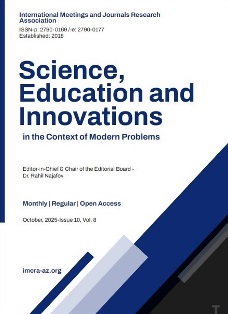-
Artificial Intelligence (AI) Policy
Journal Title: Science, Education and Innovations in the Context of Modern Problems
ISSN (Print): 2790-0169 ISSN (Online): 2790-0177
DOI Prefix: 10.56334/sei
Established: 2018 Publishing Country: Azerbaijan
Publisher: IMCRA – International Meetings and Journals Research Association
Editor-in-Chief: Dr. Rahil Najafov (Azerbaijan) | ORCID: 0000-0003-2460-6333
1. Authorship and Accountability
Large Language Models (LLMs), such as ChatGPT or similar generative AI tools, do not meet the authorship criteria set forth by this journal. Authorship carries with it responsibilities of integrity, accountability, and intellectual contribution, which cannot be attributed to non-human tools. Therefore, AI tools cannot be listed as authors under any circumstances.
2. Disclosure of AI Use
The use of AI tools for content generation, data analysis, summarization, or language support must be transparently disclosed in the manuscript:
-
If an AI tool was used to assist in content generation or writing, this use must be clearly stated in the Methods section.
-
If the manuscript does not contain a Methods section, the disclosure must be included in a suitable alternative section (e.g., Acknowledgments or Introduction).
Example:
“Portions of this manuscript were assisted by ChatGPT (OpenAI, 2025) to generate initial language drafts, which were subsequently reviewed and revised by the authors.”
3. AI-Assisted Copy Editing
The use of AI tools for copy editing and language refinement (e.g., grammar correction, spelling, punctuation, clarity improvement) does not require formal disclosure. This is categorized as AI-assisted copy editing, defined as:
“AI-assisted improvements to human-generated texts for readability and style, including corrections of grammar, spelling, punctuation, tone, and formatting — without generative editorial or autonomous content creation.”
Authors remain fully responsible for the final content and must ensure that AI-assisted edits accurately reflect their original intent and scholarly standards.
4. Ethical and Responsible Use
Authors are expected to use AI tools ethically and responsibly, ensuring that:
-
No confidential data or personally identifiable information is shared with public AI platforms.
-
The use of AI does not compromise academic integrity or mislead readers.
-
All final submissions represent the original intellectual work of the human authors.
5. Peer Review and Editorial Process
Reviewers and editors may also use AI tools to assist with language clarity and technical evaluation, provided such use:
-
Is kept confidential,
-
Does not compromise the independence of the review,
-
Does not result in unauthorized sharing of manuscript content.
All decisions remain the sole responsibility of the assigned human editors and reviewers.
For further inquiries related to AI use or authorship ethics, authors are encouraged to contact the editorial office at 📧 editor@imcra-az.org.
-
















